The political system The United Kingdom is a

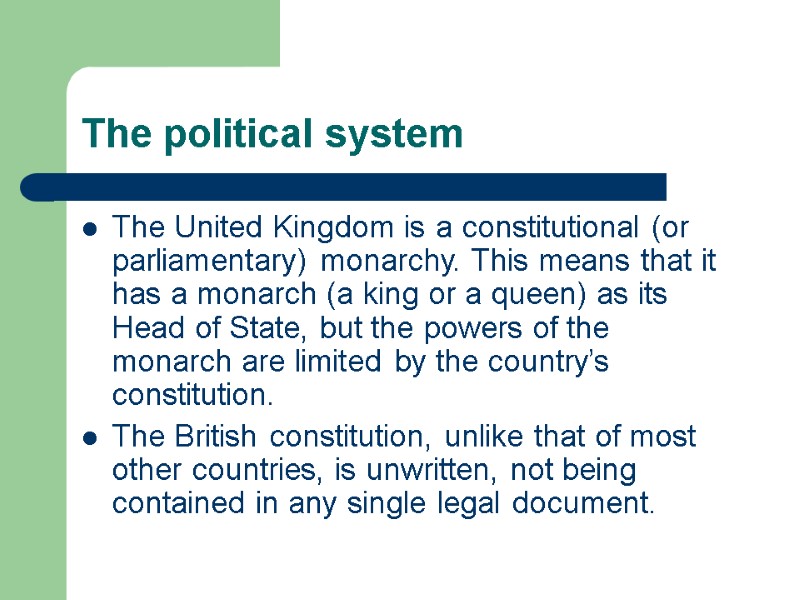
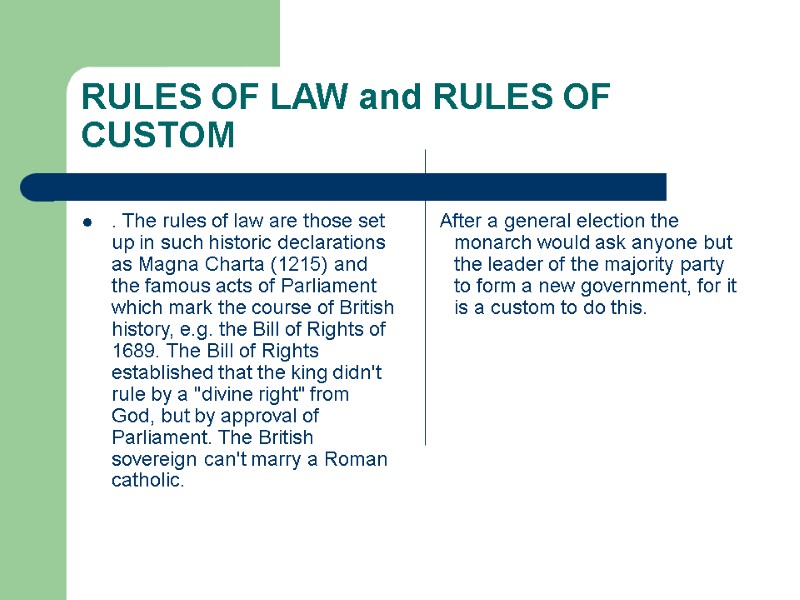
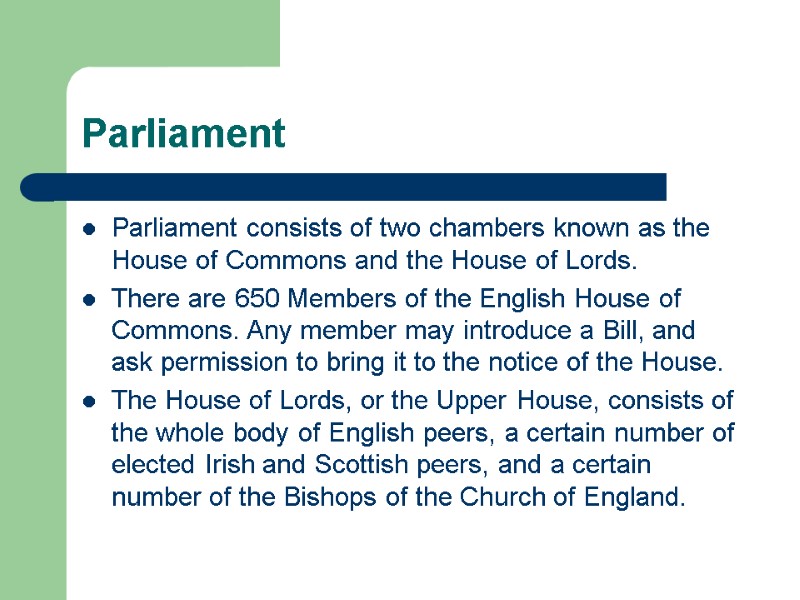
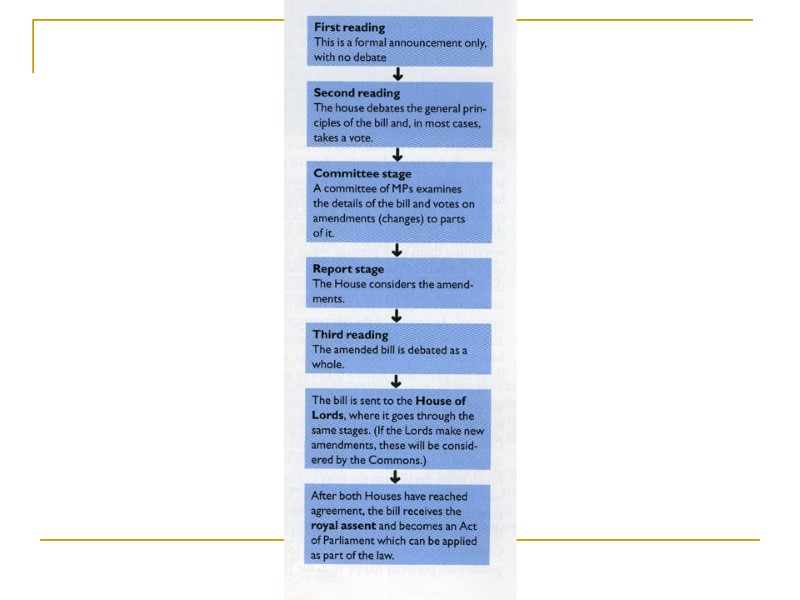
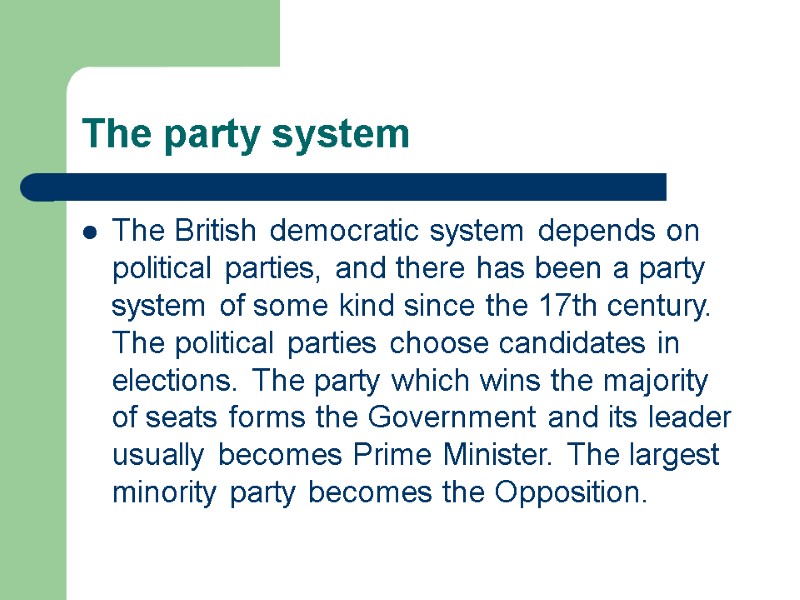
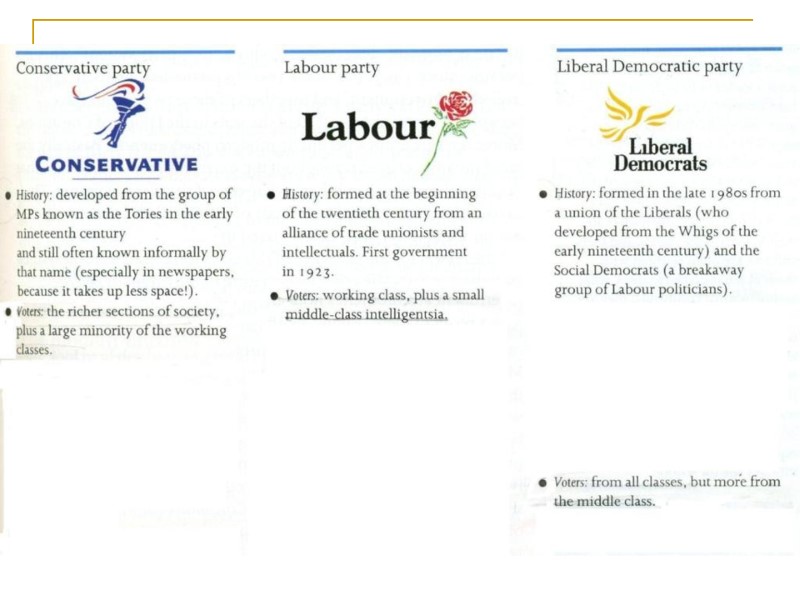
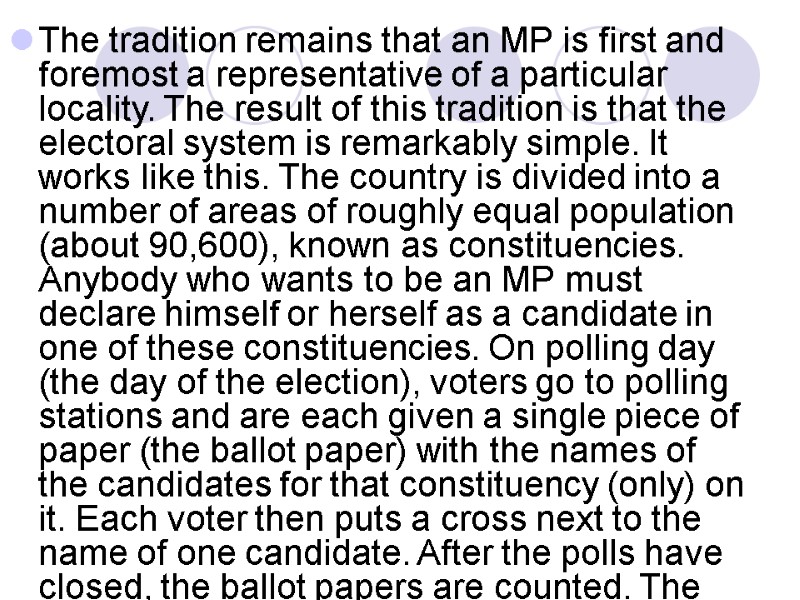
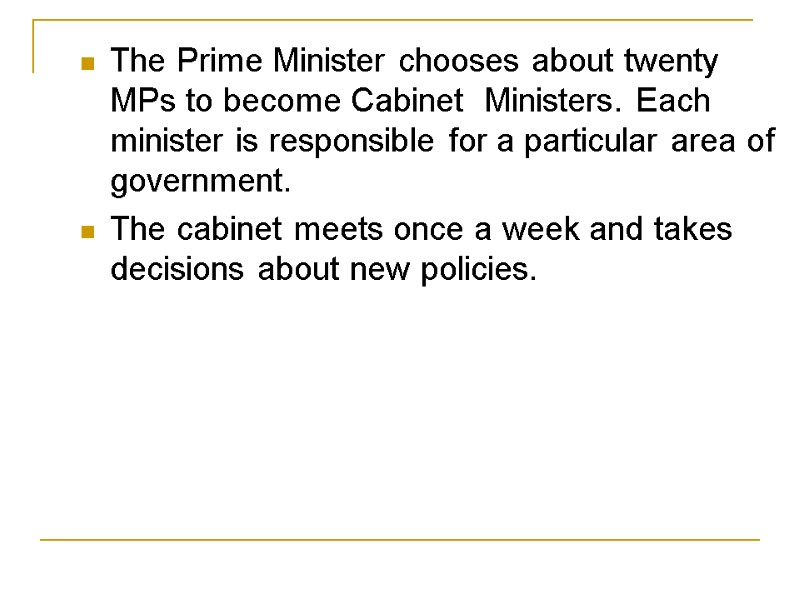
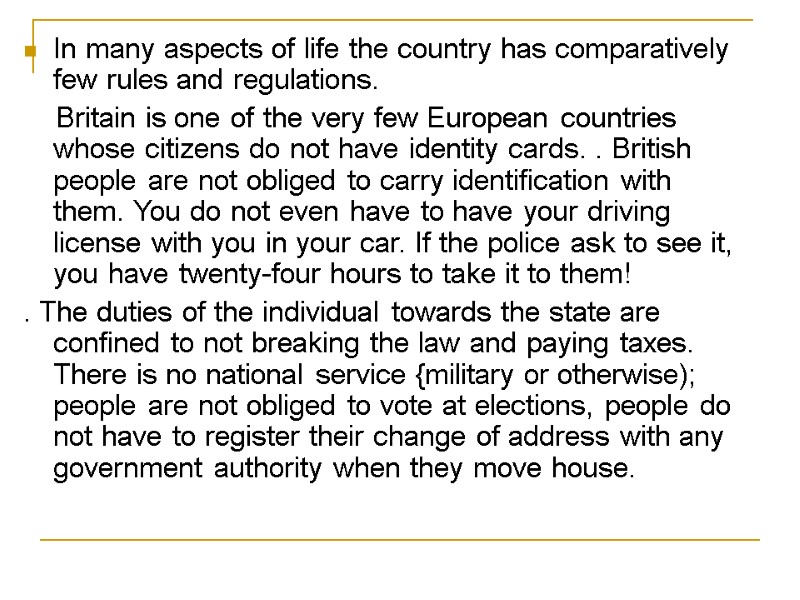
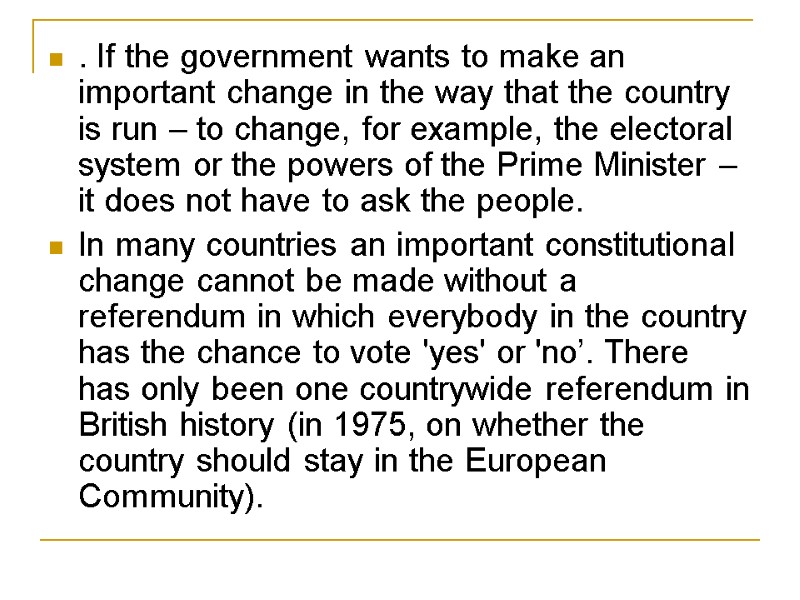
9666-the_political_system.ppt
- Количество слайдов: 10
 The political system The United Kingdom is a constitutional (or parliamentary) monarchy. This means that it has a monarch (a king or a queen) as its Head of State, but the powers of the monarch are limited by the country’s constitution. The British constitution, unlike that of most other countries, is unwritten, not being contained in any single legal document.
The political system The United Kingdom is a constitutional (or parliamentary) monarchy. This means that it has a monarch (a king or a queen) as its Head of State, but the powers of the monarch are limited by the country’s constitution. The British constitution, unlike that of most other countries, is unwritten, not being contained in any single legal document.
 RULES OF LAW and RULES OF CUSTOM . The rules of law are those set up in such historic declarations as Magna Charta (1215) and the famous acts of Parliament which mark the course of British history, e.g. the Bill of Rights of 1689. The Bill of Rights established that the king didn't rule by a "divine right" from God, but by approval of Parliament. The British sovereign can't marry a Roman catholic. After a general election the monarch would ask anyone but the leader of the majority party to form a new government, for it is a custom to do this.
RULES OF LAW and RULES OF CUSTOM . The rules of law are those set up in such historic declarations as Magna Charta (1215) and the famous acts of Parliament which mark the course of British history, e.g. the Bill of Rights of 1689. The Bill of Rights established that the king didn't rule by a "divine right" from God, but by approval of Parliament. The British sovereign can't marry a Roman catholic. After a general election the monarch would ask anyone but the leader of the majority party to form a new government, for it is a custom to do this.
 Parliament Parliament consists of two chambers known as the House of Commons and the House of Lords. There are 650 Members of the English House of Commons. Any member may introduce a Bill, and ask permission to bring it to the notice of the House. The House of Lords, or the Upper House, consists of the whole body of English peers, a certain number of elected Irish and Scottish peers, and a certain number of the Bishops of the Church of England.
Parliament Parliament consists of two chambers known as the House of Commons and the House of Lords. There are 650 Members of the English House of Commons. Any member may introduce a Bill, and ask permission to bring it to the notice of the House. The House of Lords, or the Upper House, consists of the whole body of English peers, a certain number of elected Irish and Scottish peers, and a certain number of the Bishops of the Church of England.

 The party system The British democratic system depends on political parties, and there has been a party system of some kind since the 17th century. The political parties choose candidates in elections. The party which wins the majority of seats forms the Government and its leader usually becomes Prime Minister. The largest minority party becomes the Opposition.
The party system The British democratic system depends on political parties, and there has been a party system of some kind since the 17th century. The political parties choose candidates in elections. The party which wins the majority of seats forms the Government and its leader usually becomes Prime Minister. The largest minority party becomes the Opposition.

 The tradition remains that an MP is first and foremost a representative of a particular locality. The result of this tradition is that the electoral system is remarkably simple. It works like this. The country is divided into a number of areas of roughly equal population (about 90,600), known as constituencies. Anybody who wants to be an MP must declare himself or herself as a candidate in one of these constituencies. On polling day (the day of the election), voters go to polling stations and are each given a single piece of paper (the ballot paper) with the names of the candidates for that constituency (only) on it. Each voter then puts a cross next to the name of one candidate. After the polls have closed, the ballot papers are counted. The candidate with the largest number of crosses next to his or her name is the winner and becomes the MP for the constituency.
The tradition remains that an MP is first and foremost a representative of a particular locality. The result of this tradition is that the electoral system is remarkably simple. It works like this. The country is divided into a number of areas of roughly equal population (about 90,600), known as constituencies. Anybody who wants to be an MP must declare himself or herself as a candidate in one of these constituencies. On polling day (the day of the election), voters go to polling stations and are each given a single piece of paper (the ballot paper) with the names of the candidates for that constituency (only) on it. Each voter then puts a cross next to the name of one candidate. After the polls have closed, the ballot papers are counted. The candidate with the largest number of crosses next to his or her name is the winner and becomes the MP for the constituency.
 The Prime Minister chooses about twenty MPs to become Cabinet Ministers. Each minister is responsible for a particular area of government. The cabinet meets once a week and takes decisions about new policies.
The Prime Minister chooses about twenty MPs to become Cabinet Ministers. Each minister is responsible for a particular area of government. The cabinet meets once a week and takes decisions about new policies.
 In many aspects of life the country has comparatively few rules and regulations. Britain is one of the very few European countries whose citizens do not have identity cards. . British people are not obliged to carry identification with them. You do not even have to have your driving license with you in your car. If the police ask to see it, you have twenty-four hours to take it to them! . The duties of the individual towards the state are confined to not breaking the law and paying taxes. There is no national service {military or otherwise); people are not obliged to vote at elections, people do not have to register their change of address with any government authority when they move house.
In many aspects of life the country has comparatively few rules and regulations. Britain is one of the very few European countries whose citizens do not have identity cards. . British people are not obliged to carry identification with them. You do not even have to have your driving license with you in your car. If the police ask to see it, you have twenty-four hours to take it to them! . The duties of the individual towards the state are confined to not breaking the law and paying taxes. There is no national service {military or otherwise); people are not obliged to vote at elections, people do not have to register their change of address with any government authority when they move house.
 . If the government wants to make an important change in the way that the country is run – to change, for example, the electoral system or the powers of the Prime Minister – it does not have to ask the people. In many countries an important constitutional change cannot be made without a referendum in which everybody in the country has the chance to vote 'yes' or 'no’. There has only been one countrywide referendum in British history (in 1975, on whether the country should stay in the European Community).
. If the government wants to make an important change in the way that the country is run – to change, for example, the electoral system or the powers of the Prime Minister – it does not have to ask the people. In many countries an important constitutional change cannot be made without a referendum in which everybody in the country has the chance to vote 'yes' or 'no’. There has only been one countrywide referendum in British history (in 1975, on whether the country should stay in the European Community).

